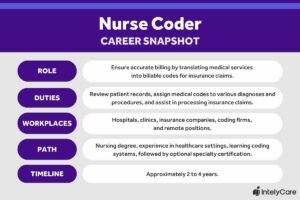How to Become a Nurse Coder

A nurse coder is a unique blend of two vital professions — nursing and medical coding — combining clinical expertise with the technical skills to decipher healthcare records into accurate medical codes. Nurse coders then use these codes for billing and insurance claims, which are essential for the financial stability of healthcare facilities.
If you’re tired of bedside nursing and looking for ways to step into administrative roles, then becoming a registered nurse (RN) coder could be a great step for you. Our step-by-step guide can help you start your journey into this unique specialty.
What Is Coding in Nursing?
A registered nurse coder is a healthcare professional who translates diagnoses, treatments, and procedures into standardized medical codes like ICD-10, CPT, and HCPCS. Their main goal is to ensure accurate billing and insurance claims, helping healthcare providers get paid correctly.
For example, if a patient arrives at the orthopedic unit with a leg fracture after a fall, the RN coder would start by examining the patient’s medical record, paying close attention to the initial assessment, imaging results (like X-rays), and the treatment plan. Next, they would assign medical codes, such as:
- Diagnosis code: For example, if the patient has a fracture of the right femur, the appropriate ICD-10 code would be S72.001A.
- Procedure code: If the patient goes through an open reduction and internal fixation (ORIF) surgery for the fracture, the coder will use the CPT code 27506 (surgical procedure on the femur).
The RN coder then makes sure the documentation backs up the assigned codes. Finally, they submit the codes to the billing department, making sure the services provided will be reimbursed by the insurance company.
What Does a Nurse Coder Do?
Wondering what your workday looks like in this role? A nurse coder job description typically includes the following responsibilities:
- Review clinical documentation to make sure all information is complete and accurate.
- Assign medical codes for diagnoses, procedures, and treatments.
- Ensure compliance with healthcare regulations and reimbursement guidelines to avoid issues with insurance claims.
- Work closely with nurses, physician assistants, and other healthcare staff to clarify documentation and ensure accuracy in coding.
- Review medical records to spot any discrepancies, coding errors, or areas for improvement.
- Stay updated on changes in coding systems, regulations, and billing practices, including those for Medicare and Medicaid, to ensure compliance.
- Support the insurance claims process by providing accurate and timely coding information.
- Offer training and guidance to healthcare providers on proper documentation practices to ensure accurate coding.
- Make sure all patient information is handled according to HIPAA regulations to protect patient privacy.
To do their job, nurse coders need a strong understanding of medical terminology, standards of care, and healthcare regulations, as well as coding systems.
Where Do Nurse Coders Work?
Nurse coders can use their skills in a variety of settings within the healthcare industry that accept insured patients. Some common places include:
- Acute care facilities
- Ambulatory care centers
- Coding and billing firms
- Hospices
- Home healthcare agencies
- Insurance companies
- Long-term care facilities
- Rehabilitation centers
- Research institutions
- Surgical centers
- Telehealth companies
Many nurse coders have the option to work from home or on a hybrid basis, which allows for greater flexibility and work-life balance. (You can explore the latest remote nursing jobs on IntelyCare.)
How to Become a Coding Nurse
Intrigued by nurse coding? Here’s a breakdown of the key steps required to enter this nursing specialty.
1. Get a Nursing Degree
To get started, you’ll need to complete prerequisite courses to get accepted in either an associate or bachelor’s degree program. During your studies, you’ll take classes, such as pathophysiology and pharmacology, and gain practical experience through clinical rotations — all to ensure you have a solid base to launch your nursing career.
2. Obtain Licensure
Next up is the NCLEX-RN, the national certification exam for registered nurses. This exam assesses your preparedness to practice nursing safely. Once you pass, you can submit your application for an RN license to your state board of nursing.
3. Gain Experience
To work effectively as an RN coder, you need clinical experience. How else are you going to know the treatment protocols for various conditions and whether they comply with set standards? Consider gaining experience in the following nursing specialties that deal with diverse conditions; this can help you become well-versed in various areas of nursing knowledge:
- Medical-surgical nursing
- Critical care
- Intensive care units
- ER nursing
- Progressive care
- Trauma nursing
4. Attain Nurse Coder Certification (Optional)
The American Academy of Professional Coders (AAPC) offers Certified Professional Coder (CPC) certification you can benefit from. Here’s what you need to know about it:
- Eligibility: You’ll need to complete the 12-week Fundamentals of Medicine training or have equivalent clinical experience in anatomy, pathophysiology, and medical terminology to qualify for an exemption.
- Preparation materials: Take the CPC exam prep training and read AAPC-approved code books, such as:
- Application process: Set up an online account, choose your exam, fill in the required fields, and submit a payment.
- Exam: 4-hour test with 100 multiple-choice questions
- Cost: $399
- Renewal: Every 2 years
It’s important to note that CPC certification is just one coding certification for nurses. Depending on where you work, your employer may require you to get a different certification, such as:
- Certified Clinical Documentation Specialist (CCDS)
- Certified Inpatient Coder (CIC)
- Certified Outpatient Coder (COC)
- Certified Coding Specialist (CCS)
- Registered Health Information Technician (RHIT)
- Certified Risk Adjustment Coder (CRC)
- Certified Evaluation and Management Coder (CEMC)
5. Pursue Advanced Education (Optional)
Want to move into leadership or teaching roles? You might want to explore advanced degrees such as a Master of Science in Nursing (MSN) or a Doctor of Nursing Practice (DNP). This can be a great step if your career goals are as big as the list of codes you work with.
What Is a Nurse Coder Salary?
The typical salary for medical record specialists in the U.S. is about $53,690 per year, or
$25.81 per hour. You might make more or less depending on your education, experience, and geographic location. To maximize your earnings, consider applying to these top-paying locations:
Wondering what a typical remote RN coder salary might be? Whether you work from home or at a healthcare facility might have a small impact on your salary, but it’s less of a factor than your education, certification, and experience.
Frequently Asked Questions: Nurse Coder
What is the career outlook for nurse coders?
The need for medical record specialists is expected to rise by 9% over the next decade — much faster than the average job growth for other occupations. Since most people in the U.S. have health insurance, nurse coders are crucial in making sure healthcare providers get paid.
Can I get an RN coding certification online?
Yes, you can earn nurse coding certification online. Many organizations, like AAPC and the American Health Information Management Association (AHIMA), offer online courses and live remote-proctored exams for coding certification, making it convenient to complete from home. Just make sure to choose an accredited program.
Where can I learn about medical coding for nurses?
You can learn about medical coding through online courses offered by professional organizations like AAPC and AHIMA. However, there are also free or low-cost nurse coding courses you can explore:
- i2MC by Absolute Medical Coding Institute (AMCI)
- Medical Coding Certification Course by Udemy
- Basics of Medical Billing and Coding by Free Medical Billing Training
- How to Become a Medical Coder by Alison
- Medical Billing and Coding Certification by CrossPurpose
What are the challenges faced by nurse coders?
One of the challenges in this nursing specialty is handling documentation gaps. Incomplete or unclear clinical documentation can make it difficult to assign correct codes, often requiring communication with healthcare providers for clarification.
Find Your Next Nursing Role With IntelyCare
Ready to become a nurse coder or explore other career opportunities? Our advanced job matching system will help you uncover the latest nursing jobs that align with your unique skills and career goals. Sign up today to start a new page in your career journey.

